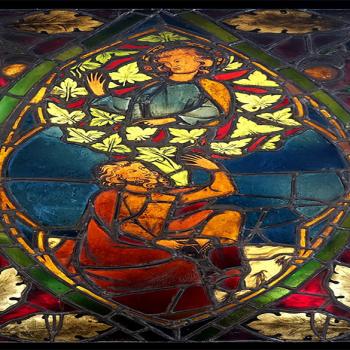What is the effect of technology on our souls? And how do people of faith discern what is good and what is harmful? Today I've invited my friend John Dyer for a thoughtful discussion on the intersection of faith and technology.
Dyer (Th.M., Dallas Theological Seminary) has been a web developer for more than ten years, building tools for Apple, Microsoft, Harley Davidson and the Department of Defense. He currently serves as the Director of Web Development for Dallas Theological Seminary and lives near Dallas with his wife Amber and two children, Benjamin and Rebecca. He has written on technology and faith for Christianity Today and Collide Magazine. His first book, From the Garden to the City, is forthcoming in August.
A professor in seminary shocked your thinking by saying, "The worst thing you can believe is that technology is neutral." I've always subscribed to this theory. What's wrong with that view?
When we say, "technology is neutral," we usually mean that our tools aren't themselves morally good or evil, because what matters is the way in which we use them. Computers should be used for Bible study, not porn; phones for calling in pizza orders, not bomb threats; and shovels for building orphanages, not axe-murdering.
But what we often forget is that whether we use a shovel for good (building an orphanage) or evil (axe-murdering) either way we end up with blisters at the end of the day. And as we continue using our shovels, those blisters will turn into calluses and our arms and backs will get more muscular.
In other words, tools and technology are not neutral because while we use them to transform the world, they transform us in turn. And they don't just transform our bodies. They also transform business and culture. We acknowledge as much when we say, "iTunes changed the music industry," or "Kindle has transformed the way we buy and read books."
If you buy that, then the bigger question is, "Can technology change my soul?"
You say that we often consume technology without fully understanding its impact. How is this dangerous?
About ten years ago, when I got my first job as a youth pastor, I bought a video projector so I could show passages of Scripture onscreen for kids who didn't have Bibles.
After a few months, I noticed that even fewer kids were bringing Bibles, and those who did bring Bibles never opened them. At first I worried that I was the world's worst youth pastor, until I realized that there was no reason for them to open their Bibles if I was projecting it onscreen.
Clearly, the projector was not "neutral" in the sense that using it transformed the way my kids and I encountered the Word of God. I'm not saying that I know whether it's better or worse for kids to read from their own personal copy of the Bible versus reading projected text, but I do think it's important for us to recognize these kinds of changes that technology brings.
Technology has given unprecedented opportunities for the church to expand the gospel witness in the world. Has technology has been a net plus?
Ever since Adam and Even invented clothing (Gen 3:7) and God gave them a free upgrade (Gen. 3:21), humans have shown incredible ingenuity in creating technology that can (partially) overcome the effects of the fall. It's almost like we really were created in the image of someone who himself is really good at creating! Advances in medicine over the last century have greatly reduced infant mortality and significantly increased life expectancies. Communication technologies offer tremendous opportunities for spreading the gospel. I am personally involved in writing online education software for a seminary, and Bible software for distributing the Scriptures in closed countries.
But I'm not so concerned with whether or not technology offers us a "net plus" as I am with helping us recognize that technology always brings a "net change."
Cars have changed where we live, microphones have increased the sizes of our churches, microwaves alter family mealtime, and video projectors reconfigure our experience of the Word. Focusing all our time on whether technology is "bad" or "good" tends to blind us from all of these other very significant changes that technology brings.
It seems that Christians can be divided into two categories: those who yearn for a less technology-cluttered time and those who are in love with technology and what it enables them to do. Is there a third way that embraces our calling in the twenty-first century without becoming a slave to twenty-first-century tools?





